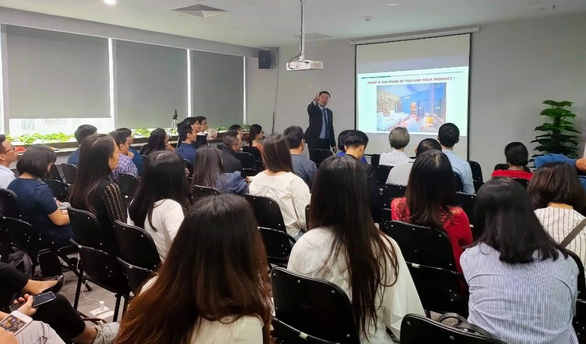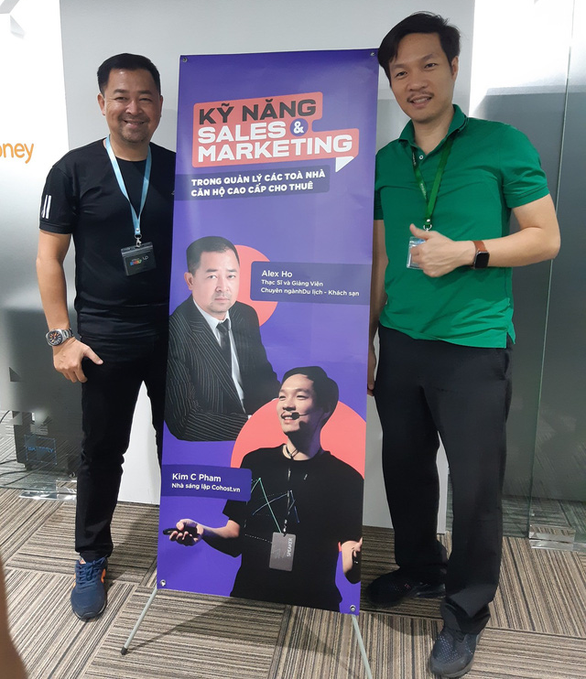Like other businesses in the tourism industry, CohostAI – a homegrown Vietnamese version of Airbnb which uses AI technology to match travelers with accommodation providers – struggled to keep its head above water during the pandemic.
When the pandemic first hit Vietnam and halted both international and domestic travel, CohostAI was faced with the same question thousands of other tourism-related businesses found themselves faced with: change or die?
Being flexible to survive
CohostAI is a pioneer in applying AI technology to the operation and marketing of rental accommodations in Vietnam.
The startup’s CEO and founder, Pham Kim Cuong, who goes by Kim Pham, spent ten years working as an engineer at major tech firms, including Google and Airbnb, before launching CohostAI.
Aside from operating a web-based marketplace for accommodation, CohostAI has rented several of its own properties, both of which have taken a hit during the pandemic.
According to Kim Pham, startups like his have had difficulty accessing government stimulus packages meant to ease the financial burdens of COVID-19.
Those operating within the tourism industry, in particular, have had to reinvent themselves in order to adapt to the ‘new normal.’
Pham Kim says this reinvention has typically manifested itself in four different ways.
First, travel-related businesses have had to change their sources of clients from foreigners to domestic travelers. Second, businesses that focus on connecting travelers with accommodation have had to move to a profit-sharing model with property owners.
Third, rather than borrowing money from families and financial institutions as before, tourism-related businesses have had to seek out investments. Finally, these businesses have had to pivot towards new opportunities as they’ve arisen.
Real estate startup Apus Home, for example, has moved away from helping hosts find short-term tenants and instead now helps hosts and co-hosts find candidates for long-term leases.
While some entrepreneurs choose to sell fruits and vegetables while tourism in the country is effectively halted, others, like F&B Director, offer classes on how to clean and prepare rooms properly, mix cocktails, and other services that were rarely formally taught prior to the pandemic.
CohostAI has taken similar steps. Apart from relying on its accommodation marketplace, the startup also helps other companies raise funds from investors and make their own direct investments in tourism startups.
It has also invested in a homestay.
New products
Rather than looking at the pandemic as a threat, CohostAI has used it as an opportunity to develop new products.
Alex Ho, director of training at CohostAI, said he and his coworkers have spent the past several months developing new services that will be ready for launch once the government agrees to relaunch domestic tourism.
“I understand the hardship of those in our industry who are having difficulties because of COVID-19. It is understandable to change careers in order to earn a living. In my opinion, however, rather than giving it, it’s important to think twice about how to overcome the situation,” said Alex Ho.
Ho plans to start a new company named Alexiana that will offer sports, academic, and property tours. The property tours will be held in Ho Chi Minh City, Phu Quoc, Nha Trang, Da Nang, and Mui Ne in Phan Thiet City.
“The time of companies focusing on just one product or service is over,” said Alex Ho.
The COVID-19 pandemic is an eye-opening experience that has helped us understand that, apart from our core services, we also have to develop some ‘satellite products’ if we want to be able to deal with unexpected events,” added he.
“CohostAI has operated as a software company and our key products are software solutions, of course. Our “satellite products,” like renting apartments, tourism, real estate brokerage, and investments, however, have helped us build a board ecosystem.”
 |
| Alex Ho delivers a presentation at an event with CohostAI hosts in Ha Noi in November 2019 in this supplied photo. |
Tourism may never return to the pre-COVID status
According to Kim Pham, it is unlikely that Vietnam’s tourism sector will bounce back to what it was experiencing pre-pandemic. As a result, technology will be crucial in allowing platforms like CohostAI to provide customers with convenient tools to set up their own itineraries.
At the moment, CohostAI is partnering with Alexiana to develop a platform that will allow customers to design their own vacations by answering just 30 questions relating to their specific demands.
After completing 30 questions, a customer will be provided with a tour that meets their demands.
“The tourism industry will become more personalized in the future and technology will facilitate the trend, making tours cheaper and better,” Kim Pham said.
Brian Chesky, CEO and co-founder of Airbnb, told the BBC on September 22 that, “the pandemic has changed how we travel forever”.
According to Chesky, the demand for renting houses has increased since last summer but customer habits have changed accordingly.
Now, tenants choose to rent a house or an apartment for longer periods than before. For example, in the U.S., Airbnb found that the number of tenants who rented for extended stays increased by 70 percent in the second quarter of 2021 in comparison with the same period of 2019.
In addition, tourists now pay more attention to new and interesting destinations rather than traditional holiday locales.
CohostAI was founded in southern California’s Silicon Valley in 2016 by Kim Pham, a former engineer at Google, Airbnb, and Adobe.
The company was moved to Vietnam in 2019.
CohostAI specializes in developing software solutions in the home-sharing sector, providing hosts and co-hosts with a technical tool to run and manage their properties. They have developed a chatbot with virtual assistant Ana and the app of CohostAI Property Management to empower the hosts.
As of 2018, CohostAI had launched in six countries with 2,000 apartments and houses for rent, 1,000 property owners, and 20,000 bookings across the world.
In 2020, after being moved to Vietnam completely, CohostAI launched in nine provinces with five partners and more than 9,000 bookings.
Cohost Vietnam is currently headquartered in Hanoi with a satellite office in Ho Chi Minh City.
Like us on Facebook or follow us on Twitter to get the latest news about Vietnam!

















































